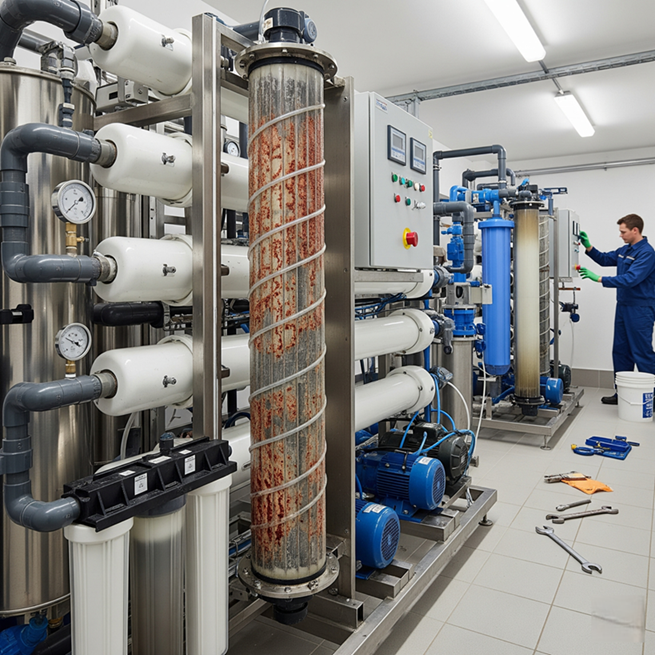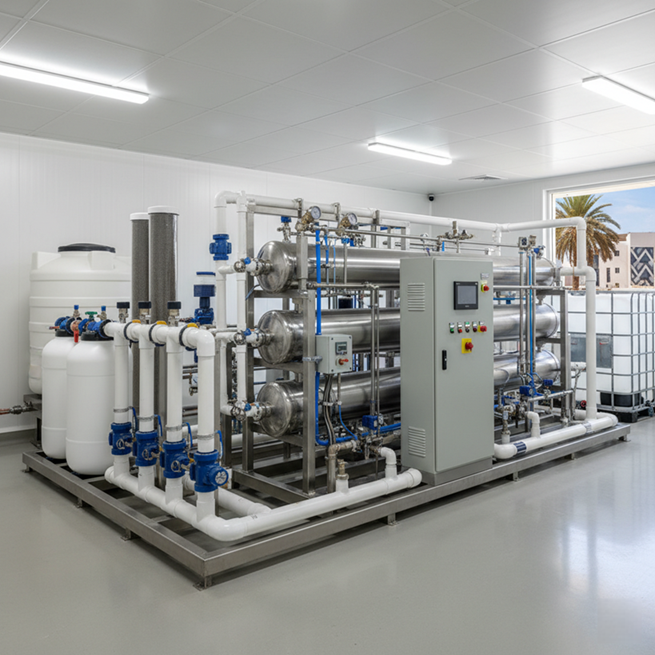
Reverse Osmosis Plant Problems in Resorts and Hotels
Hotel reverse osmosis plant operators face numerous problems that can significantly impact system efficiency and water quality. Understanding these challenges is essential to implementing effective maintenance strategies and ensuring optimal performance.
Membrane Fouling
Membrane fouling is one of the most common problems in reverse osmosis systems. It can lead to reduced water flow and increased operating pressure, resulting in increased energy consumption.
Maintenance and Repair Costs
The financial implications of maintaining a reverse osmosis plant are significant, with initial investments often starting at $100,000 and reaching millions of dollars for larger systems. These costs include not only the machinery but also installation, pre-treatment, and post-treatment systems. Furthermore, ongoing maintenance costs can accumulate, requiring budget allocation for filter replacement, membrane cleaning, and periodic inspections.
Neglecting Routine Maintenance
Neglecting routine maintenance tasks can lead to decreased system efficiency and potentially costly repairs. Problems such as filter clogs and pressure imbalances can worsen if not addressed promptly, just as ignoring a small leak can eventually lead to significant damage. Regular maintenance is essential to prevent costly downtime and ensure the water supply remains safe and clean for guests.
Learn more about: Hotel reverse osmosis plant maintenance
Professional Assistance
Complex maintenance tasks may require professional expertise to address the challenges of using hotel reverse osmosis (RO) equipment, especially when diagnosing complex problems or making major repairs. While some maintenance tasks can be done yourself, consulting a qualified technician can provide a deeper understanding of potential problems, helping to extend the life of your RO system and ensure it operates at peak performance.
This is what we at CareWater Establishment offer. We work with you every step of the way, from selecting the appropriate design to submitting a technical and financial proposal with the best possible specifications in the Saudi and global markets. CareWater also provides the best post-installation customer service, defining the necessary periodic maintenance plan to maintain the plant’s operational efficiency. We work with the best experts, technicians, and engineers in this field.
Learn more about: What lies behind every successful project: the hidden power of superior technical and financial proposals.
Regulatory Compliance
Compliance with hotel reverse osmosis (RO) plant regulations is critical to ensuring safe and potable drinking water for guests and employees. Compliance typically includes adherence to local, regional, and national water quality standards, as well as waste management regulations. Failure to comply can result in significant penalties, including fines or even facility closure.
Water Quality Standards
RO plants must meet specific water quality standards set by government authorities and industry standards. In many areas, these standards are enforced by local government agencies, which set regulations regarding water purity and permissible limits for various contaminants.
Documentation and Maintenance
Routine maintenance and thorough documentation of compliance activities are critical. Best practices include maintaining a detailed log of all maintenance tasks performed, such as filter changes and inspections. This helps track compliance and troubleshoot potential issues. Implementing a computerized maintenance management system (CMMS) can improve task tracking and ensure adherence to preventative maintenance protocols.
Customized Compliance Approaches
The regulatory landscape can vary significantly from region to region, necessitating customized compliance strategies for multinational hotel chains. For example, emerging markets may have more stringent regulations regarding water recycling and disposal, such as India, which has introduced standards to encourage water reuse in commercial facilities. Therefore, hotels in these regions must align their reverse osmosis systems with these evolving regulations.
Employee Training and Awareness
To ensure compliance, it is essential to train employees on the operational standards and regulatory requirements related to reverse osmosis systems. This includes educating them about key water quality parameters, such as total dissolved solids (TDS) and pH, to help detect potential problems before they escalate. Regular training sessions can reinforce these practices, ensuring that all employees are familiar with and able to adhere to regulatory standards.
Cost Considerations
Establishing and maintaining a hotel reverse osmosis (RO) plant requires various financial considerations, ranging from initial investment costs to ongoing operating expenses.
Initial Setup Costs
The cost of setting up a reverse osmosis plant can vary significantly depending on the type and capacity of the system. For commercial RO plants, initial costs typically range between $10,000 and $100,000, and are influenced by factors such as system capacity and optional features like automation and remote monitoring.
Industrial RO plants, on the other hand, are more complex and expensive, with installation prices starting at $100,000 and potentially reaching millions of dollars, depending on size and complexity. This investment is not limited to machinery alone but also includes installation, labor, and the essential pre- and post-treatment systems required for optimal performance.
Membrane Costs
The choice of RO membranes significantly impacts the overall cost. For example, a 200-gallon-per-day membrane, suitable for large homes or small commercial operations, ranges in price from $53 to $100.
For higher-capacity needs, a 400-gallon-per-day membrane typically ranges in price from $133 to $200. Industrial membranes, designed for large-scale applications, are more expensive, ranging from $267 to $667 or more, depending on the required technical specifications.
Maintenance and Operation Costs
Ongoing maintenance is a critical aspect of cost considerations. Regular maintenance tasks, including filter changes, membrane cleaning, and checking for leaks or pressure imbalances, are essential to ensuring the system’s efficiency and longevity. Failure to adhere to a maintenance schedule can result in reduced efficiency and costly repairs in the future.
Routine maintenance not only protects against unexpected breakdowns but also extends the life of the equipment, potentially saving money on long-term repairs and replacements. Furthermore, many reverse osmosis system providers require regular maintenance to maintain the validity of the warranty, adding another layer of financial commitment for hotel operators.
Return on Investment
While the initial investment in a reverse osmosis plant may seem burdensome, the long-term savings in maintenance and utility costs can offset these expenses. By improving water quality, hotels can reduce plumbing and appliance consumption, ultimately saving costs over time. Additionally, improved water quality increases guest satisfaction, which can lead to repeat business and positive reviews, further contributing to hotel profitability.
Innovations and Developments
Technological Improvements in Reverse Osmosis Systems
The hospitality industry is experiencing a surge in the adoption of innovative reverse osmosis technologies, which incorporate smart features such as automation and IoT sensors. These developments enable hotels to monitor system performance in real time, improving water quality and operational efficiency by automatically adjusting parameters to boost recovery rates by 30-40%. The integration of remote diagnostics aids in preventative maintenance, ensuring smooth system operation and reducing downtime.
Sustainability Initiatives
Sustainability is a key driver of innovation in the hotel industry, with many hotel chains committed to using environmentally friendly water technologies. The implementation of reverse osmosis systems aligns with the growing trend towards acquiring prestigious environmental certifications, such as EDGE and LEED. This encourages hotels to invest in water-saving solutions as part of their broader environmental strategies. By reducing reliance on bottled water and improving overall water management, hotels can significantly reduce their environmental footprint while enhancing guest experiences.
Strategic Partnerships and Market Dynamics
The evolving hotel reverse osmosis systems market focuses on strategic partnerships. This enables the provision of localized services and installation support that adapt to regulatory requirements. This approach not only ensures compliance but also fosters community engagement and encourages the adoption of local solutions tailored to specific regional needs. Emerging markets, particularly in the Asia-Pacific region and parts of Africa and Latin America, present untapped growth opportunities, driven by growing consumer demand and urbanization.

























